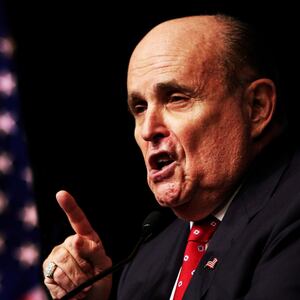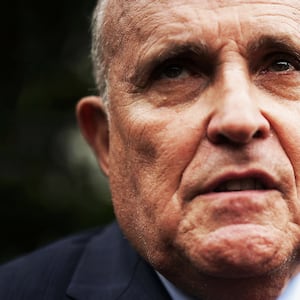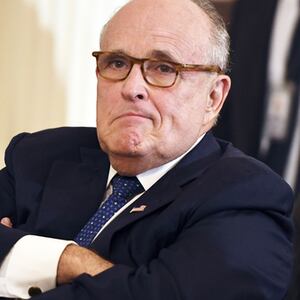Hunter Biden was 12 years old when Rudolph Giuliani first accused his father of breaking the law.
The animus between Giuliani and the elder Biden is widely believed to go back to a stinging one-liner about 9/11 during the 2007 election. But the grudge, in fact, began decades earlier.
In early January 1983, Giuliani was the associate attorney general, No. 3 in the U.S. Justice Department. Joe Biden was a U.S. senator from Delaware and sponsor of a bill to establish a cabinet-level “Drug Czar” to coordinate all federal efforts to curb narcotics trafficking.
The legislation had been passed at 2 a.m., without hearings. Giuliani urged President Ronald Reagan to veto it.
“Naive, simplistic and hopelessly flawed,” Giuliani said of Biden’s provision.
Giuliani always has more words, so he also said, “It is shocking and irresponsible that legislation making these kinds of changes was passed without a single hearing in Congress and without any kind of thoughtful consideration.”
Biden went to see Reagan at the White House, bringing along a draft of a Government Accounting Office report which found that a failure of the various federal agencies to coordinate their efforts was leading to an overall failure to stop more than a small fraction of the illegal drugs pouring into the country. Giuliani accused Biden of leaking the report before the agencies involved had an opportunity to respond, those prominently including the Justice Department.
“In violation of GAO rules and the law,” Giuliani charged.
A Biden spokesman replied that the senator had done “nothing illegal.”
Reagan vetoed the measure and narcotics kept pouring into the country. Biden kept pushing and a drug czar was finally established four years later. Narcotics still kept pouring into the country.
“The biggest lie in law enforcement is, ‘We’re working closely together on this,’” the late NYPD Deputy Commissioner Jack Maple noted at the time.
Meanwhile, Giuliani had discovered that being No. 3 of anything was not for him. His spot in the hierarchy did make him privy to all of the DOJ’s big cases, and this included one in New York where prosecutors were well on the way to locking up the members of the Mafia’s ruling commission there. Giuliani took a demotion to become the U.S. attorney for the Southern District of New York and stepped onto center stage to become a star mob buster, indicting the heads of all five of the city’s crime families in what was dubbed the Commission Case.
The evidence included photographs of a May 1984 meeting of mob bosses at a house in Staten Island. An accompanying affidavit attested that the main topic of the gathering was Mafia control of the construction industry. One example they all surely knew was Trump Tower, which had been completed in 1983 thanks to concrete provided by a firm linked to the Genovese crime family and a labor favor accorded by the Gambino crime family. The tower was the only construction site in New York to remain open during a citywide strike.
Giuliani the mob buster ran for mayor and lost, but ran again and won. He would have been blamed if crime went up during his tenure, so he should be credited for the record drop. That, even though to this day he does not seem to understand it, was largely because the NYPD for the first time treated every crime seriously, whether it was on the richest block in Manhattan or the poorest block in Brooklyn.
The streets became safer, but Giuliani became ever nuttier. He was abrasive and divisive and the tumult of his personal life became increasingly public. He ended up exhausting even the city that never sleeps.
On Sept. 10, 2001, Giuliani came down the front steps of City Hall with several aides and not a single passerby called out his name or waved or otherwise acknowledged his presence. The parade had clearly passed him by.
The next morning, the planes flew into the World Trade Center. Giuliani was on television enough in the aftermath to become known as the face of 9/11. Oprah Winfrey called him “America’s Mayor.”
In 2007, Giuliani moved to parlay that into becoming America’s president.
One problem for him was that he had been to emergency rooms to visit so many shot cops during his time as mayor that he had filed a lawsuit in June of 2000 against two dozen gun manufacturers. He charged the companies with “profiting from the suffering of innocent people” while engaging in “a number of illegal and immoral practices."
“The single biggest connection between violent crime and an increase in violent crime is the presence of guns in your society,” Giuliani declared. “The more guns you take out of society, the more you are going to reduce murder. The less guns you take out of society, the more it is going to go up.”
But that was forgotten when Giuliani spoke as a Republican candidate for president at the NRA convention in Washington, D.C., in September of 2007.
“You should know I understand that the right to bear arms is just as important a right in the Constitution as the right of free speech and other rights,” he told the gathering.
He paused during the speech to take a cellphone call from his now estranged wife, Judith.
“Hello, dear, I’m talking to the members of the NRA right now, would you like to say hello?” Giuliani said. “Talk to you later, dear… I love you.”
For just the price of his soul, Giuliani became the frontrunner for the Republican nomination. His name then came up during a Democratic debate that October. Maybe a grudge was what roused Biden to rare and devastating originality.
“Rudy Giuliani, there's only three things he mentions in a sentence; a noun, a verb, and 9/11,” Biden said.
The Giulani campaign responded by alluding to Biden’s plagiaristic past: “Rudy rarely reads prepared speeches and when he does he isn’t prone to ripping off text from others. Senator Biden certainly falls into the bucket of those on stage tonight who have never had executive experience and have never run anything. Senator Biden has never run anything but his mouth.”
The Biden campaign responded to the response: “We are well aware that former Mayor Giuliani will attempt to drag this race into the mud, where Republicans like to wage their campaigns.”
A month later, a federal grand jury lodged corruption, tax fraud, perjury and obstruction of justice charges against Bernard Kerik, who had served as police commissioner under Giuliani. Kerik also had subsequently been nominated by President Bush at Giuliani’s urging to become secretary of homeland security. Bush had withdrawn the nomination after it became known that Kerik had hired an undocumented immigrant as a nanny.
Kerik was now headed for prison. His name was one that appeared in none of Giuliani’s sentences as the one-time frontrunner dropped out of the race.
For a time, Giuliani faded from public life. His desire to make some kind of comeback became painfully clear when Republican presidential nominee Donald Trump visited Ground Zero on the 15th anniversary of 9/11. Trump’s many lies about the friends he had lost and what he had seen and what he had done on that day did not prevent America’s Mayor from abjectly fawning over him.
The three things Giuliani now mentioned in a sentence were a noun, a verb and Donald Trump.
When Trump was elected, Giuliani supposedly had several big jobs that were his for the asking: attorney general, director of national intelligence, even the spot he had once pushed for Kerik to become, secretary of homeland security. But the position he sought was apparently the one he was about to name during an interview with Sean Hannity.
“I wanted to be secretary…” he began.
He stopped before actually saying that his hope had been to become secretary of state. He was for some reason deemed too temperamental to be America’s Statesman. He has done little to prove his doubters wrong as he assumed the role of Trump’s personal lawyer. He may have been seeking to be the answer to Trump's question “Where’s my Roy Cohn?”
Like Cohn, Giuliani represents Trump at no charge. Giuliani has plenty of money coming in from other ventures. These include his security and consulting firm, which does business in realms where the myth of America’s Mayor persists. He may be a joke in the Bronx, but he is still a big shot in Ukraine.
The much bigger shot there was Biden, who had gone on to become vice president. Biden had been delegated by President Obama to marshal American efforts to remedy pervasive corruption in Ukraine.
The Ukrainian prosecutor general, Viktor Shokin, had taken office pledging to end crooked dealings by politically connected businesses. He had mentioned in particular the gas company Burisma.
But by most accounts, Shokin was all talk and no action. A host of West European countries, along with the International Monetary Fund, wholeheartedly supported Biden’s conclusion that Shokin had to go. Biden suggested to then-Ukrainian President Petro Poroshenko that a $1 billion loan guarantee might not be forthcoming if Shokin remained in office.
One complication was provided by Hunter Biden, now in his forties, but with considerably less sense than he should have had even at 12. Hunter took a seat on the Burisma board, getting paid as much as $50,000 a month even though he knew nothing about gas and not much more about Ukraine.
Here, Giuliani had an opportunity to play statesman and get back at Biden. Giuliani began saying that Biden had forced out Shokin in order to stop an investigation into Burisma and Hunter. Giuliani urged the new Ukrainian prosecutor to investigate both Bidens for wrongdoing.
In a rough transcript of the now-famous phone call, Trump tells Ukrainian President Volodymyr Zelensky, “I will have Mr. Giuliani give you a call and I am also going to have Attorney General Barr call and we will get to the bottom of it. I’m sure you will figure it out. I heard the prosecutor was treated very badly and he was a very fair prosecutor so good luck with everything.”
At the time, Trump was withholding promised military aid to Ukraine. The context imparts a certain resonance to the moment in the transcript when Trump says, “I would like you to do us a favor though.”
The line harkens back to a Commission Case transcript where Gambino crime family boss Paul Castellano bragged on tape of his influence, saying “the President is a big man” but “everybody can do somebody a little favor.”
Trump’s talk of a favor no doubt spurred the still-unidentified whistleblower to report the possibility that our president was using the held-up aid to pressure Zelensky into digging up dirt on the Democratic candidate in the lead to oppose him in the next election.
And more than three decades after that first scrap over a drug czar bill, Giuliani was again accusing Joe Biden of breaking the law, this time along with the child-man Hunter.
And Giuliani’s sentences were now a noun and a verb and Biden.









